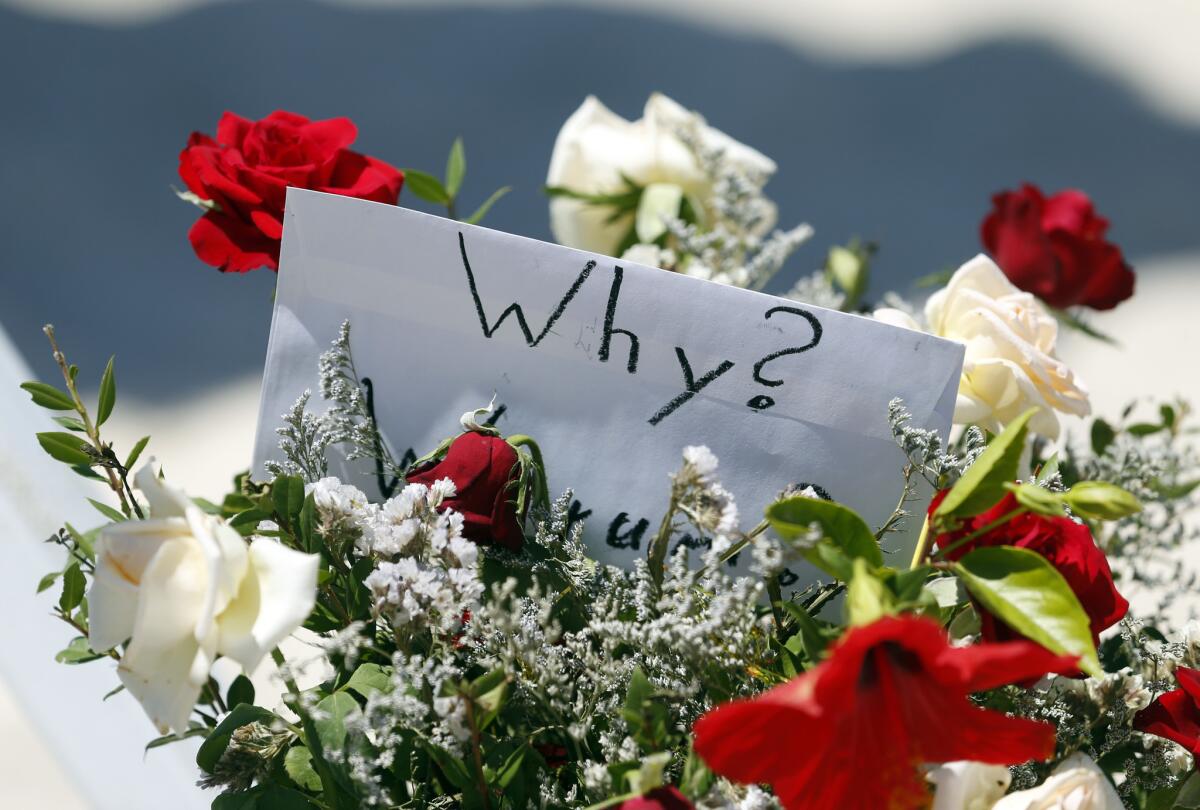Tourists stream out of Tunisia after massacre at beach resort

Flowers mark the scene the morning after a mass shooting in Sousse, Tunisia.
- Share via
Reporting from Cairo — As hundreds of frightened tourists fled Tunisia on Saturday, the North African country’s leaders announced stringent new security measures in response to a massacre at a popular Mediterranean resort that left at least 38 people dead, nearly two-thirds of them British visitors.
The mass shooting on Friday in the coastal city of Sousse was the worst terror strike in the modern history of Tunisia, which had been considered an island of relative stability in an increasingly volatile region.
Within hours of the attack, diplomats, airlines and tour operators stepped in to provide bus transport from the stricken hotel and neighboring resorts to the nearest airport for flights out. More than a dozen evacuation flights took off overnight and at least 10 more were scheduled Saturday, the French news agency AFP reported. It said at least 2,500 foreign visitors expected to be repatriated by day’s end.
Elsewhere in the region, the Persian Gulf emirate of Kuwait declared a national day of mourning for victims of its own tragedy on Friday, the bombing of a crowded Shiite mosque. The death toll in that strike, the first of its kind in Kuwait, rose to 27, with more than 200 injured.
As it did in Kuwait, Islamic State claimed responsibility for the attack in Tunisia. The jihadist group had also asserted that it carried out a deadly attack in March on a landmark museum in the capital, Tunis, though that claim was later called into question by Tunisian authorities, who blamed an Al Qaeda offshoot instead.
The museum attack left more than 20 people dead, and most of those victims, too, were European tourists.
Tunisian authorities emphasized that the motives and methods in Friday’s assault remained under investigation. The one known assailant, shot dead by security forces, was identified as a student at a university in Kairouan, an inland city known for its piety.
In preparation for the attack, the gunman disguised himself as a beachgoer, in shorts and a T-shirt, and used a beach umbrella to conceal his Kalashnikov assault rifle. Terrified swimmers and sunbathers scattered as he raked the hotel beach and pool area with gunfire.
In a triumphalist statement issued hours after the attack, Islamic State asserted online that it had targeted “infidels” at the seaside resort, adding that the victims were “mostly from Crusader countries that are fighting … the Caliphate,” a reference to the group’s self-declared state in parts of Iraq and Syria.
Tunisian officials announced Saturday that the 38 dead in the Sousse shootings included 24 British nationals – a heavy toll that British Prime Minister David Cameron had warned his public to expect as the magnitude of the assault became clear. The targeted hotel was popular with package tours originating in the United Kingdom.
The others killed included seven Tunisians, three Belgians, a Russian, a Ukrainian and a German, said Kamel Jendoubi, a Tunisian government minister. One victim’s nationality had not been determined, he said, though Irish authorities had previously said one Irish woman was killed.
Heightened safety measures unveiled at an overnight news conference by Prime Minister Habib Essid included the mobilization of army reservists for deployment to tourist-heavy areas such as beach resorts and archaeological sites, and the planned shutdown of some 80 mosques operating outside official controls and accused of “spreading venom.”
The prime minister also hinted at the possibility of a broader crackdown on political parties and other entities acting “outside the constitution,” a move that could prompt a backlash from Tunisia’s sizable Islamist bloc.
Islamists won power at the polls following the country’s 2010-11 uprising, which set off a wave of pro-democracy revolts across the region. But after a disastrous run at ruling Tunisia, the Islamists later ceded power and agreed to work in cooperation with a secular-minded administration.
Still reeling from the March museum attack, Tunisia now faces a heavy new blow to its tourist trade, a mainstay of the faltering economy. Economic discontent was a driving force behind the uprising against longtime dictator Zine Abidine Ben Ali that erupted nearly five years ago, and chronic joblessness among young men is viewed as heightening the lure of Islamic extremism.
Tunisia has been the source of thousands of Islamic State recruits for the battlefield in Syria, and authorities fear their return home could have a deeply destabilizing effect. Chaos in neighboring Libya has also rattled Tunisia; the museum attackers were reported to have received training there.
Staff writer King reported from Cairo and special correspondent Hassan from Berlin.
Twitter: @laurakingLAT
More to Read
Sign up for Essential California
The most important California stories and recommendations in your inbox every morning.
You may occasionally receive promotional content from the Los Angeles Times.













